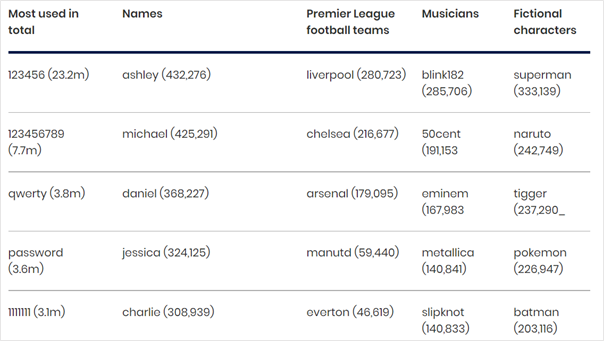What do Ashley, Liverpool, Blink182 and Superman all have in common? No this isn’t the set up for a joke. These are some of the most commonly used passwords as per a recent survey.

The National Cyber Security Centre or NCSC have published their first UK Cyber Survey with some interesting findings. The survey comprised of 1,350 telephone interviews with the general public aged 16+ and you can see some of the key statistics below as well as our comments and advice.
“Only 15% say they know a great deal about how to protect themselves from harmful activity”
This first and foremost is a concerning statistic. Our general advice to clients when it comes to scams and phishing attacks is to always err on the side of caution. Take a moment before clicking on links or attachments in emails as this could save you from falling victim. This is probably one of the best ways to protect yourself and something that hopefully more than 15% of people know.
“70% believe they will likely be a victim of at least one specific type of cyber crime over the next 2 years”
Again, another worrying statistic. Whilst scammers can still find a way in with even the most security savvy person, by being cautious you can lower your risk tenfold. Having the mentality that it’s inevitable is likely to make you less cautious.
“37% agree that losing money or personal details over the internet is unavoidable these days”
If you’re careful it shouldn’t be easy to ‘lose’ money or personal details over the internet. Often, it’s times when people have given away this information without even realising. We recently wrote a blog about Social Engineering. This is a method cyber criminals use to gain personal information and an example of this is the surveys that go around Facebook periodically. They’re simply asking for a range of personal details that they think may be either your password or memorable information – and you’re literally giving this away.
“70% always use PINs and passwords for smart phones and tablets”
Password protecting your devices is important for two reasons. Not only does it protect your data and personal information on the device itself, it’s also imperative if you use 2 factor authentication (2FA). This is where you’re required to provide a second piece of information, usually a code that’s sent to a separate device to the one you’re trying to log in to. If your device isn’t password protected then if this is stolen, this extra layer of security is redundant.
Strong passwords are only part of the solution
Whilst a strong password helps provide a barrier to protect your personal data there are additional layers you can add to secure your business. Antivirus and Firewalls help identify and block harmful threats from causing damage to your assets. Speak to us today about how we can improve your IT security and protect your business.
You can view the full report here.

